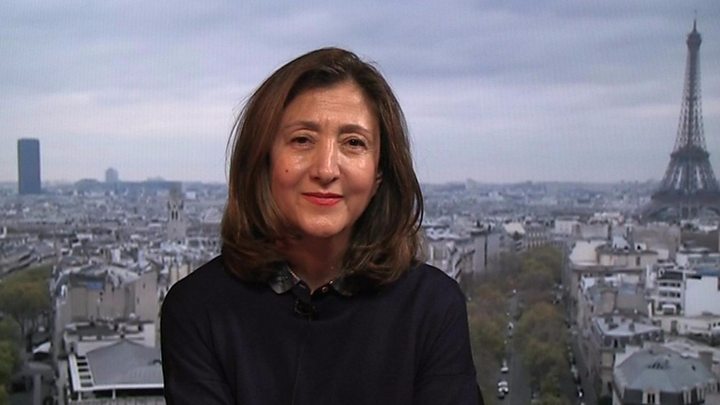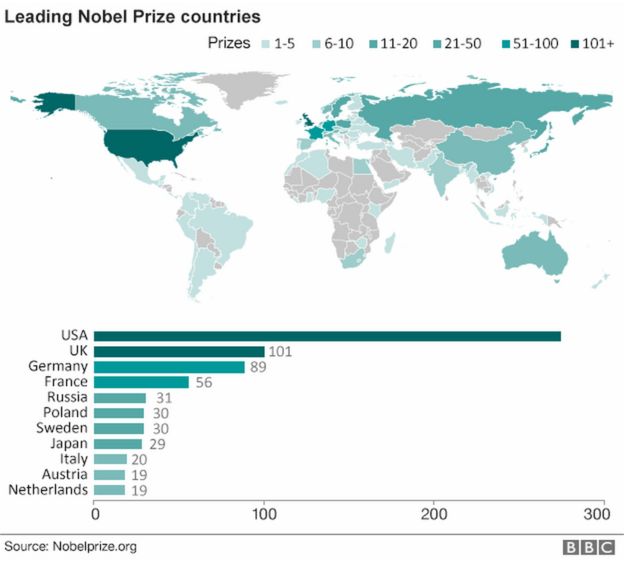Nobel Peace Prize for Colombia's Juan Manuel Santos
 AFP
AFP
Colombian President Juan Manuel Santos has been awarded the Nobel Peace Prize for his efforts to end the 52-year conflict with left-wing rebels.
The Nobel committee praised him for a peace deal signed with Farc rebels, but rejected by Colombians in a vote.
Mr Santos said he dedicated the award to "all the victims of the conflict", and the Farc leader congratulated him.
About 260,000 people have been killed and more than six million internally displaced in Colombia.
The award did not include Farc leader Rodrigo Londono, known as Timochenko, who also signed the accord.
- Who are the Farc?
- Colombia media hopeful over Santos peace prize
- Viewpoint: What next for Colombia?
- Santos: From hawk to dove
The head of the Nobel commitee said the award recognised the president's "resolute efforts" to end the conflict.
"The award should also be seen as a tribute to the Colombian people who, despite great hardships and abuses, have not given up hope of a just peace, and to all the parties who have contributed to the peace process," Kaci Kullman Five added.
Juan Manuel Santos
 EPA
EPA- Born in Bogota in 10 August 1951 in an influential family
- Elected Colombian president in 2010 and re-elected in 2014
- Served as defence minister from 2006 until 2009
- Married, has two sons and one daughter
Sources: BBC Monitoring, Colombian presidency
Mr Santos said on Twitter: "This honourable distinction is not for me, it's for all the victims of the conflict. Together we'll win the most important award of them all: peace."
The peace deal was rejected by 50.2% of voters who went to the polls on 2 October.
The committee acknowledged the result, saying: "What the 'No' side rejected was not the desire for peace, but a specific peace agreement."
It also said that finding a balance between the need for reconciliation and ensuring justice for the victims would be a difficult challenge.
Also on Twitter, Farc leader Timochenko said: "I congratulate President Juan Manuel Santos, Cuba and Norway, who sponsored the process, and Venezuela and Chile, who assisted it, without them, peace would be impossible."
Earlier, he had written: "The only prize we aspire to is peace with social justice for Colombia, without (right-wing) paramilitary groups, without retaliation or lies. Peace in the streets."

A deal that wasn't: By Jonathan Marcus, BBC diplomatic correspondent
This was a Peace Prize for a peace deal that wasn't. President Santos joins a long line of Nobel Peace Prize winners who have been rewarded for effort as much as achievement.
But it is too easy to be cynical. The Nobel Peace Prize has often been controversial. In recent years a variety of international bureaucracies have won - the EU, the IAEA and the OPCW.
Why, some have argued, should people get a prize for simply doing their job? What, others ask, had US President Barack Obama actually done to merit the prize in 2009, other than be elected?
But the Nobel has often gone to extraordinary individuals who really have gone above and beyond to bring peace - in Northern Ireland and East Timor to name just two examples. Maybe the award to President Santos may yet galvanise public opinion in Colombia to think again about the deal.
Critics, led by former president Alvaro Uribe, said the deal was too lenient to the rebels.
Under the agreement, special courts would have been created to try crimes committed during the conflict.
Those who confessed would have received lighter sentences and avoided serving any time in conventional prisons.
The Farc would also have been guaranteed 10 seats in the Colombian Congress in the 2018 and 2022 elections.

Despite the rejection by voters, Mr Santos vowed to continue with talks with the rebels.
Government negotiators have already returned to the Cuban capital Havana for further discussions with Farc leaders.
Kaci Kullman Five, from the Nobel committee, said the award was also meant as "encouragement" to the rebels.
"Giving the prize to Santos is not a belittlement to any of the other parties.
"The Farc is obviously a very important part of this process.''
The Farc's 52-year fight
 REUTERS
REUTERS
1964: Set up as armed wing of Communist Party
2002: At its height, it had an army of 20,000 fighters controlling up to a third of the country. Senator Ingrid Betancourt was kidnapped and held for six years along with 14 other hostages
2008: The Farc suffers a series of defeats in its worst year
2012: Start of peace talks in Havana
2016: Definitive ceasefire
Mr Santos was selected from a list of 376 candidates - 228 were individuals and 148 were organisations. They included:
- the Syrian White Helmets, civil defence volunteers who rescue bomb victims
- the negotiators of the international deal to limit Iran's nuclear programme
- Greek islanders on the front line of Europe's refugee crisis
 TWITTER - @SYRIACIVILDEF
TWITTER - @SYRIACIVILDEFHow the prize is decided
 AP
AP- Eligible nominators from around the world can put forward candidates up to 1 February of the award year, while Nobel Committee members have more time
- All nominations are reviewed by the committee - whose five members are chosen by the Norwegian parliament - before a shortlist of 20-30 candidates are selected
- A group of Norwegian and international advisers write individual reports on the shortlisted candidates. Using these and further reports, the committee narrows the selection down to a handful
- A decision is reached in the last meeting of the committee, usually in late September or early October, before the prize is announced
- If a unanimous decision cannot be reached, a simple majority vote is used
- After the announcement, the award ceremony takes place on 10 December, the date of Alfred Nobel's death

No comments:
Post a Comment